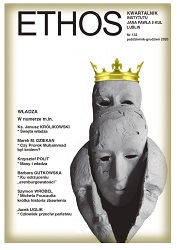Potere e autorità. Tra Foucault e Girard
Power and Authority: Between Foucault and Girard
Author(s): Furio PesciSubject(s): Political Philosophy, Civil Society, Contemporary Philosophy, Government/Political systems
Published by: Katolicki Uniwersytet Lubelski Jana Pawła II - Instytut Jana Pawła II, Wydział Filozofii
Keywords: Power; authority; Foucault and Girard; political debate; civil rights; contemporary deconstructionism; liberalism; biopolitics; biopower;
Summary/Abstract: Contemporary deconstructionism, which today is not only among the strongest currents in the culture of our time, but also an inspiring source of the political debate regarding the so-called civil rights, proposes a negative vision of the whole tradition to which the Catholic social doctrine refers. Foucault’s work is a useful tool to unmask the ideological character of the ‘deconstructivist’ attitude, as well as potential dangers related to the policies based on it. In particular, Foucault’s theories allow us to analyze the ‘liberal’ tendencies widespread in the West as an example of a new kind of ‘biopolitics,’ which maintains the aims and practices typical of the ‘biopower’ described by the French thinker. René Girard proposes an analysis of certain intellectual currents in contemporary culture, in particular deconstructionism. According to Girard, modernity is characterized by breaking classical schemes, which rigorously structured human desire according to the Logos so as to prevent conflicts among the particular desires. In modernity, which brought the individualistic affirmation of the ego, Logos (in the sense of effective rationalization of desire) gradually disappeared replaced by an ever stronger individual freedom conceived as an end in itself.
Journal: Ethos. Kwartalnik Instytutu Jana Pawła II KUL
- Issue Year: 33/2020
- Issue No: 4
- Page Range: 141-155
- Page Count: 15
- Language: Italian
- Content File-PDF

